NSG2204: Critical Analysis of Indigenous Mental Health Initiative
VerifiedAdded on 2023/06/18
|6
|1378
|107
Essay
AI Summary
This essay presents a critical analysis of the Aboriginal and Torres Strait Islander Mental Health Program, examining its goals, implementation, and impact on addressing mental health disparities within these communities. The analysis considers the role of registered nurses and Aboriginal and Torres Strait Islander health workers in delivering culturally appropriate care, highlighting the importance of addressing stigma and discrimination to ensure equitable access to services. The program's focus on integrating mental health support with other services like drug and alcohol programs and suicide prevention initiatives is discussed, along with its contribution to reducing the health gap between Indigenous and non-Indigenous Australians. The essay also acknowledges a key limitation: the program's insufficient attention to the social determinants of mental health, such as poverty and lack of education, which significantly impact the well-being of Aboriginal and Torres Strait Islander peoples. The essay concludes by emphasizing the need for a holistic approach that addresses both the clinical and socioeconomic factors contributing to mental health issues within these communities.
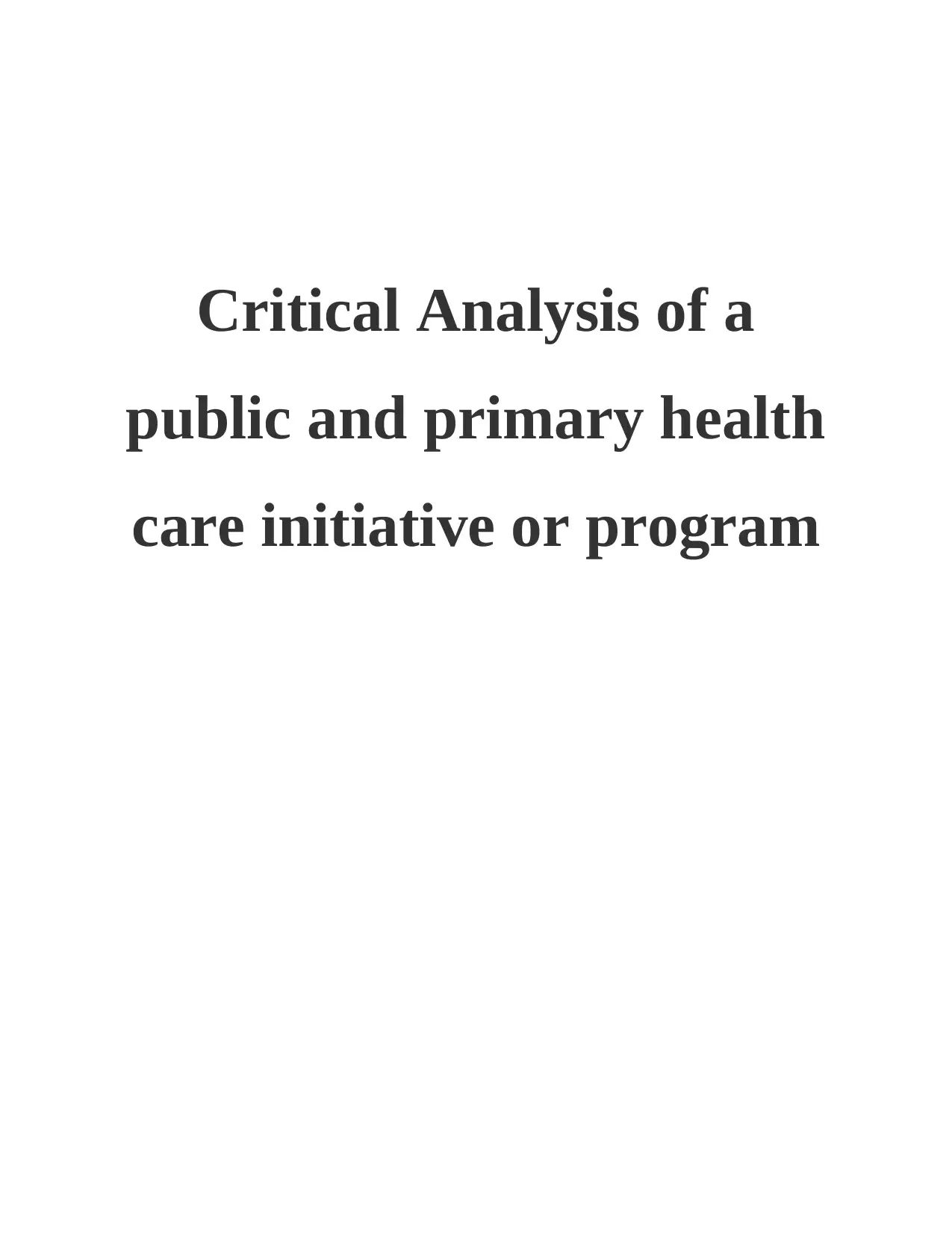
Critical Analysis of a
public and primary health
care initiative or program
public and primary health
care initiative or program
Paraphrase This Document
Need a fresh take? Get an instant paraphrase of this document with our AI Paraphraser
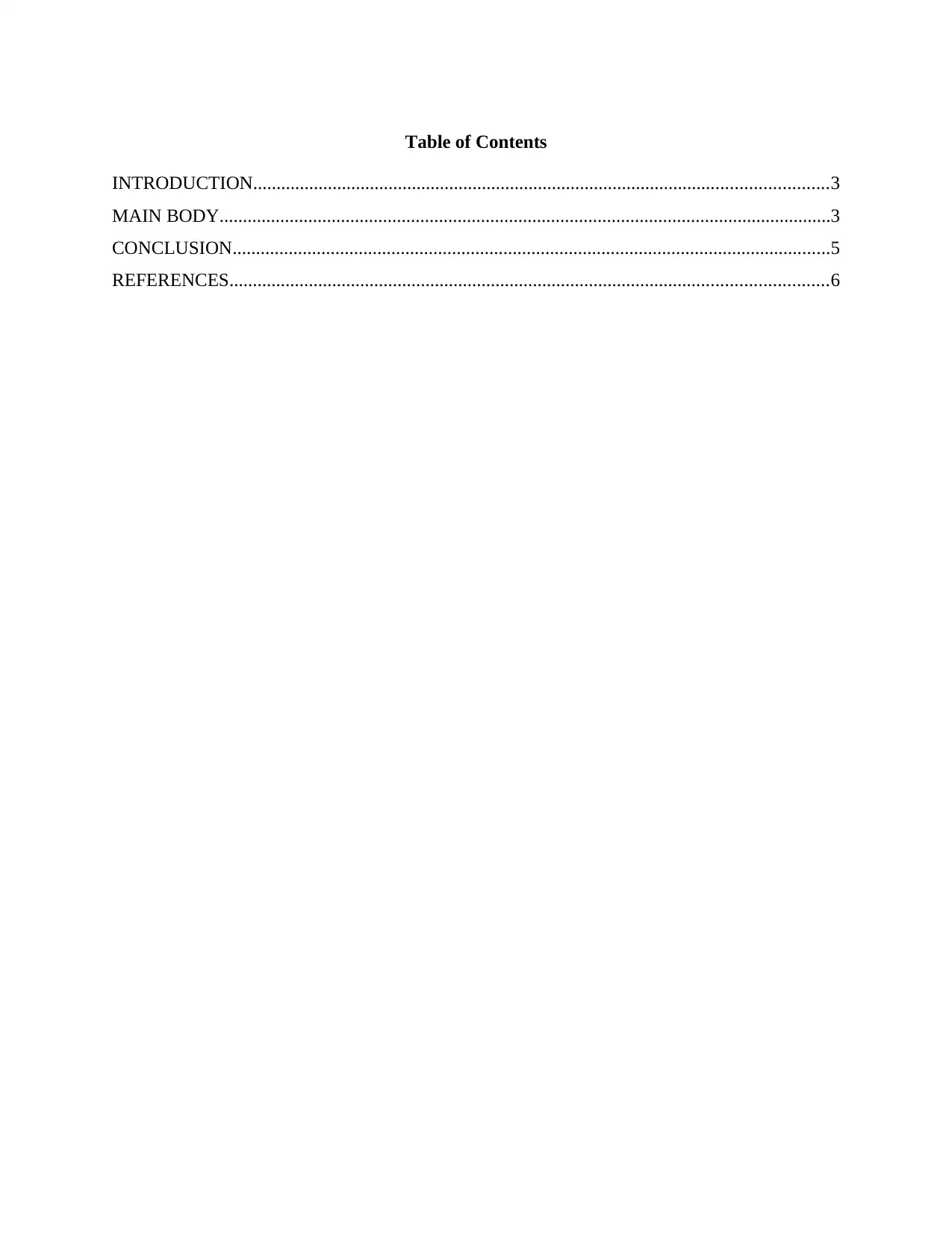
Table of Contents
INTRODUCTION...........................................................................................................................3
MAIN BODY...................................................................................................................................3
CONCLUSION................................................................................................................................5
REFERENCES................................................................................................................................6
INTRODUCTION...........................................................................................................................3
MAIN BODY...................................................................................................................................3
CONCLUSION................................................................................................................................5
REFERENCES................................................................................................................................6
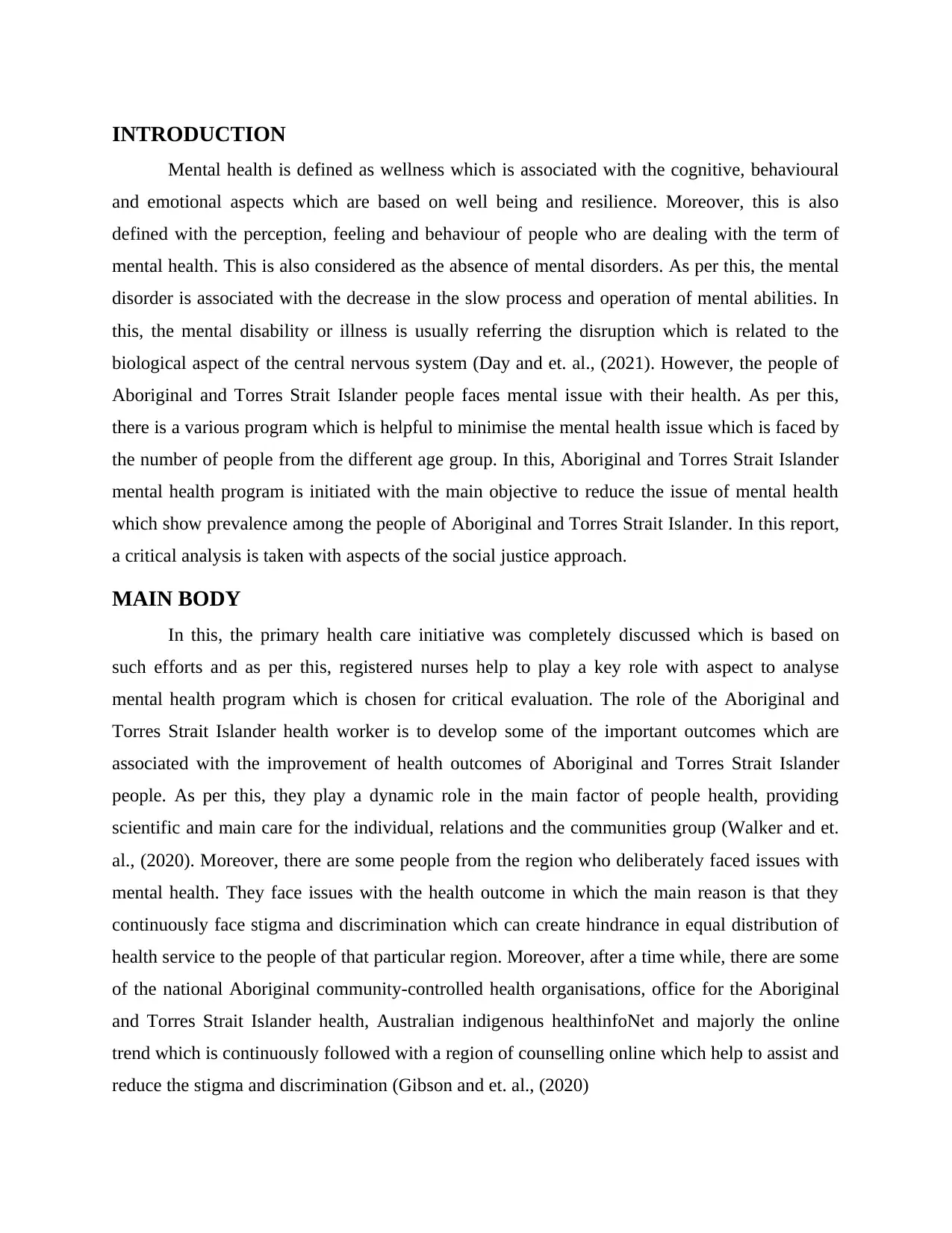
INTRODUCTION
Mental health is defined as wellness which is associated with the cognitive, behavioural
and emotional aspects which are based on well being and resilience. Moreover, this is also
defined with the perception, feeling and behaviour of people who are dealing with the term of
mental health. This is also considered as the absence of mental disorders. As per this, the mental
disorder is associated with the decrease in the slow process and operation of mental abilities. In
this, the mental disability or illness is usually referring the disruption which is related to the
biological aspect of the central nervous system (Day and et. al., (2021). However, the people of
Aboriginal and Torres Strait Islander people faces mental issue with their health. As per this,
there is a various program which is helpful to minimise the mental health issue which is faced by
the number of people from the different age group. In this, Aboriginal and Torres Strait Islander
mental health program is initiated with the main objective to reduce the issue of mental health
which show prevalence among the people of Aboriginal and Torres Strait Islander. In this report,
a critical analysis is taken with aspects of the social justice approach.
MAIN BODY
In this, the primary health care initiative was completely discussed which is based on
such efforts and as per this, registered nurses help to play a key role with aspect to analyse
mental health program which is chosen for critical evaluation. The role of the Aboriginal and
Torres Strait Islander health worker is to develop some of the important outcomes which are
associated with the improvement of health outcomes of Aboriginal and Torres Strait Islander
people. As per this, they play a dynamic role in the main factor of people health, providing
scientific and main care for the individual, relations and the communities group (Walker and et.
al., (2020). Moreover, there are some people from the region who deliberately faced issues with
mental health. They face issues with the health outcome in which the main reason is that they
continuously face stigma and discrimination which can create hindrance in equal distribution of
health service to the people of that particular region. Moreover, after a time while, there are some
of the national Aboriginal community-controlled health organisations, office for the Aboriginal
and Torres Strait Islander health, Australian indigenous healthinfoNet and majorly the online
trend which is continuously followed with a region of counselling online which help to assist and
reduce the stigma and discrimination (Gibson and et. al., (2020)
Mental health is defined as wellness which is associated with the cognitive, behavioural
and emotional aspects which are based on well being and resilience. Moreover, this is also
defined with the perception, feeling and behaviour of people who are dealing with the term of
mental health. This is also considered as the absence of mental disorders. As per this, the mental
disorder is associated with the decrease in the slow process and operation of mental abilities. In
this, the mental disability or illness is usually referring the disruption which is related to the
biological aspect of the central nervous system (Day and et. al., (2021). However, the people of
Aboriginal and Torres Strait Islander people faces mental issue with their health. As per this,
there is a various program which is helpful to minimise the mental health issue which is faced by
the number of people from the different age group. In this, Aboriginal and Torres Strait Islander
mental health program is initiated with the main objective to reduce the issue of mental health
which show prevalence among the people of Aboriginal and Torres Strait Islander. In this report,
a critical analysis is taken with aspects of the social justice approach.
MAIN BODY
In this, the primary health care initiative was completely discussed which is based on
such efforts and as per this, registered nurses help to play a key role with aspect to analyse
mental health program which is chosen for critical evaluation. The role of the Aboriginal and
Torres Strait Islander health worker is to develop some of the important outcomes which are
associated with the improvement of health outcomes of Aboriginal and Torres Strait Islander
people. As per this, they play a dynamic role in the main factor of people health, providing
scientific and main care for the individual, relations and the communities group (Walker and et.
al., (2020). Moreover, there are some people from the region who deliberately faced issues with
mental health. They face issues with the health outcome in which the main reason is that they
continuously face stigma and discrimination which can create hindrance in equal distribution of
health service to the people of that particular region. Moreover, after a time while, there are some
of the national Aboriginal community-controlled health organisations, office for the Aboriginal
and Torres Strait Islander health, Australian indigenous healthinfoNet and majorly the online
trend which is continuously followed with a region of counselling online which help to assist and
reduce the stigma and discrimination (Gibson and et. al., (2020)
⊘ This is a preview!⊘
Do you want full access?
Subscribe today to unlock all pages.

Trusted by 1+ million students worldwide
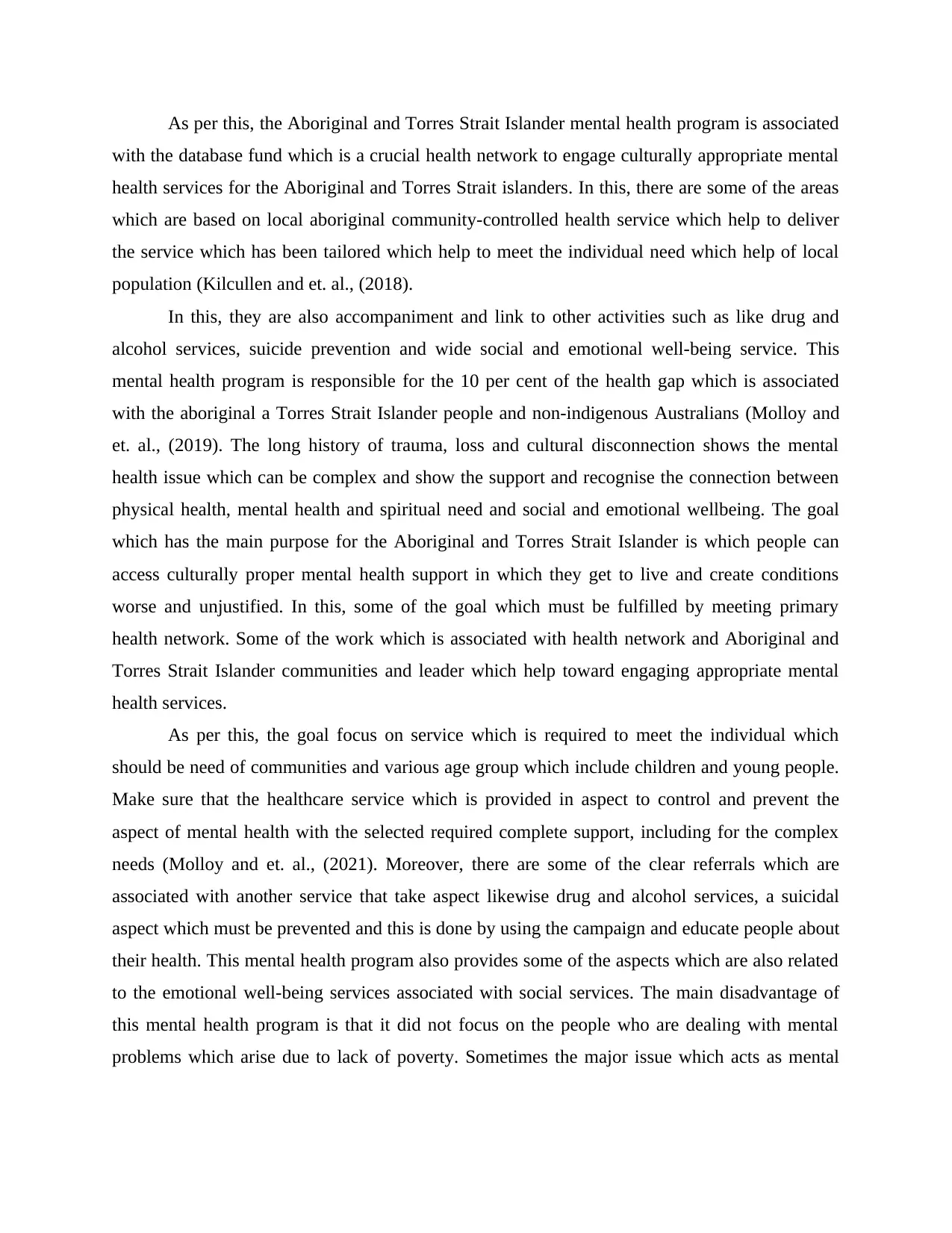
As per this, the Aboriginal and Torres Strait Islander mental health program is associated
with the database fund which is a crucial health network to engage culturally appropriate mental
health services for the Aboriginal and Torres Strait islanders. In this, there are some of the areas
which are based on local aboriginal community-controlled health service which help to deliver
the service which has been tailored which help to meet the individual need which help of local
population (Kilcullen and et. al., (2018).
In this, they are also accompaniment and link to other activities such as like drug and
alcohol services, suicide prevention and wide social and emotional well-being service. This
mental health program is responsible for the 10 per cent of the health gap which is associated
with the aboriginal a Torres Strait Islander people and non-indigenous Australians (Molloy and
et. al., (2019). The long history of trauma, loss and cultural disconnection shows the mental
health issue which can be complex and show the support and recognise the connection between
physical health, mental health and spiritual need and social and emotional wellbeing. The goal
which has the main purpose for the Aboriginal and Torres Strait Islander is which people can
access culturally proper mental health support in which they get to live and create conditions
worse and unjustified. In this, some of the goal which must be fulfilled by meeting primary
health network. Some of the work which is associated with health network and Aboriginal and
Torres Strait Islander communities and leader which help toward engaging appropriate mental
health services.
As per this, the goal focus on service which is required to meet the individual which
should be need of communities and various age group which include children and young people.
Make sure that the healthcare service which is provided in aspect to control and prevent the
aspect of mental health with the selected required complete support, including for the complex
needs (Molloy and et. al., (2021). Moreover, there are some of the clear referrals which are
associated with another service that take aspect likewise drug and alcohol services, a suicidal
aspect which must be prevented and this is done by using the campaign and educate people about
their health. This mental health program also provides some of the aspects which are also related
to the emotional well-being services associated with social services. The main disadvantage of
this mental health program is that it did not focus on the people who are dealing with mental
problems which arise due to lack of poverty. Sometimes the major issue which acts as mental
with the database fund which is a crucial health network to engage culturally appropriate mental
health services for the Aboriginal and Torres Strait islanders. In this, there are some of the areas
which are based on local aboriginal community-controlled health service which help to deliver
the service which has been tailored which help to meet the individual need which help of local
population (Kilcullen and et. al., (2018).
In this, they are also accompaniment and link to other activities such as like drug and
alcohol services, suicide prevention and wide social and emotional well-being service. This
mental health program is responsible for the 10 per cent of the health gap which is associated
with the aboriginal a Torres Strait Islander people and non-indigenous Australians (Molloy and
et. al., (2019). The long history of trauma, loss and cultural disconnection shows the mental
health issue which can be complex and show the support and recognise the connection between
physical health, mental health and spiritual need and social and emotional wellbeing. The goal
which has the main purpose for the Aboriginal and Torres Strait Islander is which people can
access culturally proper mental health support in which they get to live and create conditions
worse and unjustified. In this, some of the goal which must be fulfilled by meeting primary
health network. Some of the work which is associated with health network and Aboriginal and
Torres Strait Islander communities and leader which help toward engaging appropriate mental
health services.
As per this, the goal focus on service which is required to meet the individual which
should be need of communities and various age group which include children and young people.
Make sure that the healthcare service which is provided in aspect to control and prevent the
aspect of mental health with the selected required complete support, including for the complex
needs (Molloy and et. al., (2021). Moreover, there are some of the clear referrals which are
associated with another service that take aspect likewise drug and alcohol services, a suicidal
aspect which must be prevented and this is done by using the campaign and educate people about
their health. This mental health program also provides some of the aspects which are also related
to the emotional well-being services associated with social services. The main disadvantage of
this mental health program is that it did not focus on the people who are dealing with mental
problems which arise due to lack of poverty. Sometimes the major issue which acts as mental
Paraphrase This Document
Need a fresh take? Get an instant paraphrase of this document with our AI Paraphraser
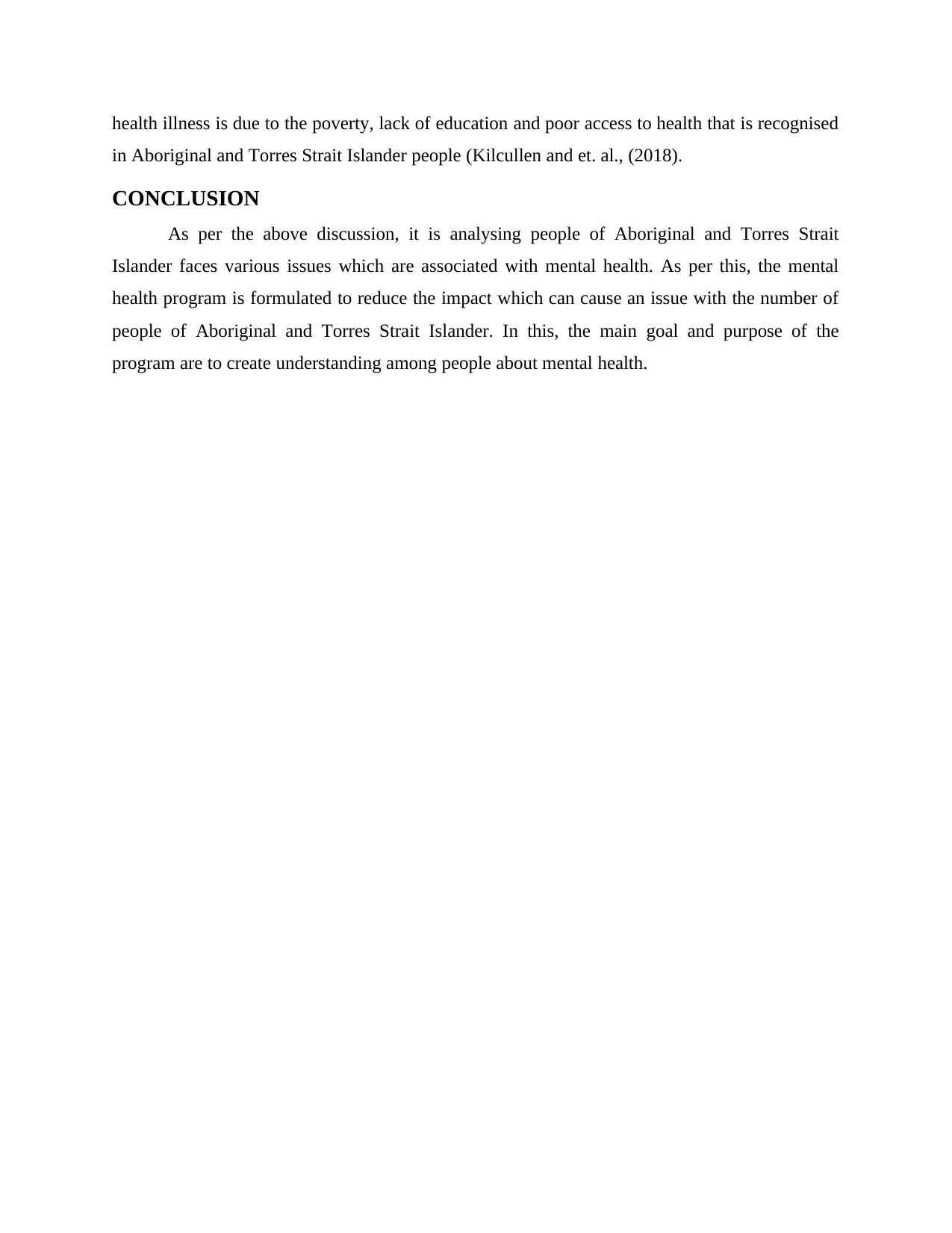
health illness is due to the poverty, lack of education and poor access to health that is recognised
in Aboriginal and Torres Strait Islander people (Kilcullen and et. al., (2018).
CONCLUSION
As per the above discussion, it is analysing people of Aboriginal and Torres Strait
Islander faces various issues which are associated with mental health. As per this, the mental
health program is formulated to reduce the impact which can cause an issue with the number of
people of Aboriginal and Torres Strait Islander. In this, the main goal and purpose of the
program are to create understanding among people about mental health.
in Aboriginal and Torres Strait Islander people (Kilcullen and et. al., (2018).
CONCLUSION
As per the above discussion, it is analysing people of Aboriginal and Torres Strait
Islander faces various issues which are associated with mental health. As per this, the mental
health program is formulated to reduce the impact which can cause an issue with the number of
people of Aboriginal and Torres Strait Islander. In this, the main goal and purpose of the
program are to create understanding among people about mental health.
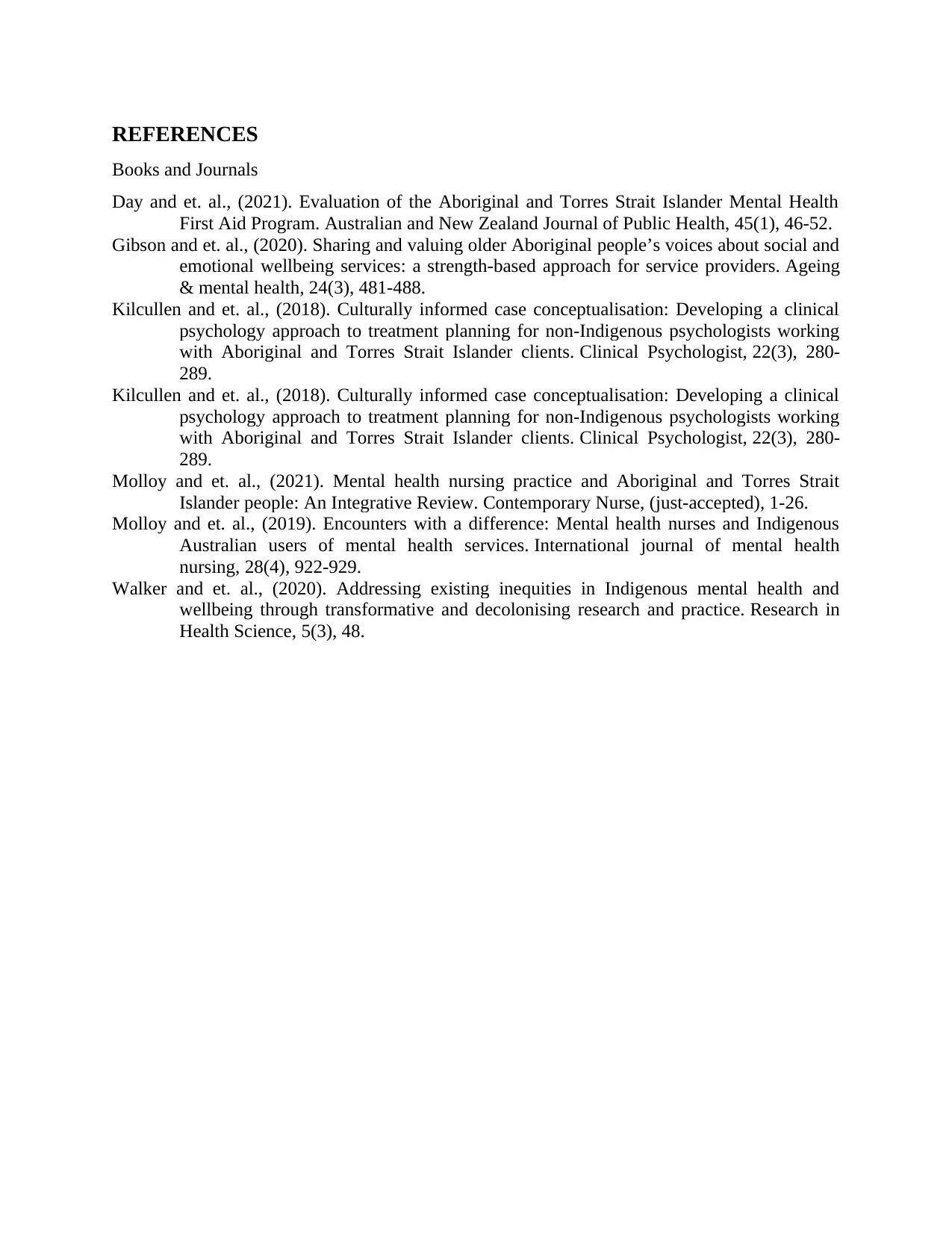
REFERENCES
Books and Journals
Day and et. al., (2021). Evaluation of the Aboriginal and Torres Strait Islander Mental Health
First Aid Program. Australian and New Zealand Journal of Public Health, 45(1), 46-52.
Gibson and et. al., (2020). Sharing and valuing older Aboriginal people’s voices about social and
emotional wellbeing services: a strength-based approach for service providers. Ageing
& mental health, 24(3), 481-488.
Kilcullen and et. al., (2018). Culturally informed case conceptualisation: Developing a clinical
psychology approach to treatment planning for non‐Indigenous psychologists working
with Aboriginal and Torres Strait Islander clients. Clinical Psychologist, 22(3), 280-
289.
Kilcullen and et. al., (2018). Culturally informed case conceptualisation: Developing a clinical
psychology approach to treatment planning for non‐Indigenous psychologists working
with Aboriginal and Torres Strait Islander clients. Clinical Psychologist, 22(3), 280-
289.
Molloy and et. al., (2021). Mental health nursing practice and Aboriginal and Torres Strait
Islander people: An Integrative Review. Contemporary Nurse, (just-accepted), 1-26.
Molloy and et. al., (2019). Encounters with a difference: Mental health nurses and Indigenous
Australian users of mental health services. International journal of mental health
nursing, 28(4), 922-929.
Walker and et. al., (2020). Addressing existing inequities in Indigenous mental health and
wellbeing through transformative and decolonising research and practice. Research in
Health Science, 5(3), 48.
Books and Journals
Day and et. al., (2021). Evaluation of the Aboriginal and Torres Strait Islander Mental Health
First Aid Program. Australian and New Zealand Journal of Public Health, 45(1), 46-52.
Gibson and et. al., (2020). Sharing and valuing older Aboriginal people’s voices about social and
emotional wellbeing services: a strength-based approach for service providers. Ageing
& mental health, 24(3), 481-488.
Kilcullen and et. al., (2018). Culturally informed case conceptualisation: Developing a clinical
psychology approach to treatment planning for non‐Indigenous psychologists working
with Aboriginal and Torres Strait Islander clients. Clinical Psychologist, 22(3), 280-
289.
Kilcullen and et. al., (2018). Culturally informed case conceptualisation: Developing a clinical
psychology approach to treatment planning for non‐Indigenous psychologists working
with Aboriginal and Torres Strait Islander clients. Clinical Psychologist, 22(3), 280-
289.
Molloy and et. al., (2021). Mental health nursing practice and Aboriginal and Torres Strait
Islander people: An Integrative Review. Contemporary Nurse, (just-accepted), 1-26.
Molloy and et. al., (2019). Encounters with a difference: Mental health nurses and Indigenous
Australian users of mental health services. International journal of mental health
nursing, 28(4), 922-929.
Walker and et. al., (2020). Addressing existing inequities in Indigenous mental health and
wellbeing through transformative and decolonising research and practice. Research in
Health Science, 5(3), 48.
⊘ This is a preview!⊘
Do you want full access?
Subscribe today to unlock all pages.

Trusted by 1+ million students worldwide
1 out of 6
Related Documents
Your All-in-One AI-Powered Toolkit for Academic Success.
+13062052269
info@desklib.com
Available 24*7 on WhatsApp / Email
![[object Object]](/_next/static/media/star-bottom.7253800d.svg)
Unlock your academic potential
Copyright © 2020–2025 A2Z Services. All Rights Reserved. Developed and managed by ZUCOL.





